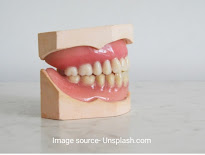Bruxism?? Here's the solution to fix it.
 |
| Image By- Rudi Fargo |
BRUXISM
Bruxism or Teeth grinding affects around 10% of population. You might be one of them who face same problem of teeth clenching or we can say teeth grinding. Many people have the habit of teeth grinding in sleep. So, they are unaware of it. That's why majority of people come to know this from their loved ones that they grind their teeth in sleep.
DEFINITION
● Ranfjord (1966) : defined Bruxism as a habitual grinding of teeth where individual is not chewing or swallowing anything.
It affects both adults and children although the 25 to 45 years age group are more commonly affected.
CLASSIFICATION OF BRUXISM
It is classified into 2 categories:
- AWAKE BRUXISM (Day time)
- SLEEP BRUXISM (Night time): It is teeth grinding that happens during sleep.
CAUSES of BRUXISM
Multiple factors are responsible for this oral health condition. So, it is usually not possible to identity one single cause behind it. Some of the possible causes are:
- Stress and Anxiety (mainly)
- Nervous tension
- Sleep apnea
- Aggressive behaviour
- Effective caffeine consumption
- Hot, cold or sweet sensitivity in teeth etc.
SIGNS AND SYMPTOMS OF BRUXISM
Grinding the teeth is one main symptom but the other symptoms are:
- Pain in the jaw
- Headache and earache
- Teeth sensitivity and rough inner surface of the cheeks
- Chipped teeth
- Broken teeth
- Cracks in teeth
- Jaw clenching etc.
If Bruxism is left untreated and neglected constantly then constant grinding wears down the teeth as well as causing many jaw disorders like temporomandibular joint disorder(TMJD).
In some cases, chronic teeth grinding can result in a fracture, loosening or sometimes loss of teeth.
When to seek medical help?
It is important to seek Medical help if you see:
- Have teeth that are worn, damaged or sensitive
- Feel pain in jaw, ear or face
- Get complaints from others about your irritating grinding noises
- Can't completely open or close your jaw
TREATMENT OF BRUXISM
Medical Treatment of Bruxism or teeth grinding:
The goals of treatment are to reduce pain, reduce clenching and prevent teeth damage.
In many cases, treatment is not necessary as majority of people overcome bruxism without any treatment. But if your condition is deteriorating, then the only option left is Dental approaches. Your Dentist may suggests best ways to improve your teeth. These methods may correct or prevent wear and tear of teeth but they may not stop bruxism.
Use of Splints and Mouth guards: To prevent any damage to teeth, mouth guards or splints have been used to treat teeth grinding and TMJ disorders. A splint may help to protect the teeth from excessive pressure of clenching. But sometimes, with splints some people find that their clenching become worse.
This prevent clenching or grinding by separating teeth. It is made up of Hard acrylic or soft material and applied over your teeth. For Ex. A splint called the NTI-tss fits over just the front teeth.
Your doctor may also prescribe you some medicines like muscle relaxants and medication for stress and anxiety.
Other methods: It includes-Stress and Anxiety Management -Learn various strategies to avoid or to manage stress and promote relaxation such as Meditation.
Behaviour modification: It includes modifying daytime behaviour is enough to reduce night time bruxism.
Self Hypnosis is also a part of alternative therapies.
In case of severe chronic conditions root canals, implants, partial or complete dentures may be also needed.
Self- treatment: It includes the steps to relieve stress or anxiety, practising good sleep habits and avoid the intake of any simulator such as caffeine in the evening.
PREVENTION OF BRUXISM
It includes the following steps:
- Avoid all foods or drinks that contain caffeine such as tea, coffee, chocolate etc.
- Avoid alcohol as grinding tends to intensify after alcohol consumption.
- Avoid chewing gum and don't chew any hard item like pencils or pens as it allows your jaw muscles to get more used to clenching.
- Train yourself not to clench your teeth by placing your tongue in between your teeth.
- Drink plenty of water and have proper sleep.
- Massage your neck, shoulder and face muscles
- Try to reduce your daily stress and learn various relaxation therapies.
- Regular visits to dentist. Your dentist likely will check for the signs and symptoms for bruxism.
If all this techniques doesn't work then Talk with your dentist to find out which option is best for you.
CONCLUSION
Bruxism or we can say clenching and grinding of teeth is a common involuntary reaction to anger, fear and stress. It is a common health issue which can be easily treated and prevented by taking appropriate measures on time. This condition may further lead to serious problem for teeth and jaws. So that's why it's treatment is necessary to reduce it's impact on teeth.
In this whole article, I provide a detailed information regarding teeth grinding problem or Bruxism. I discussed it's various causes, signs and symptoms, treatment and preventions.
For any doubt please leave your comment below. Feel free to ask and suggest anything regarding topic.
If you like this blog and feel worthy, please share and follow it. For more health related blogs stay tuned!!!!
Please let me know if you have any kind of trouble here.
Thank you for reading this !!
Happy Reading......Stay Healthy :)


Great job :)...keep it up! 👍.... Helpful for me 😁😁
ReplyDeleteGreat Job 👍👏
ReplyDeleteVery nice 👌👌
😊😊😊😊😊
Great job👍
ReplyDeleteExcellent💯💯💯
ReplyDeleteNice blog. Very crisp and informational
ReplyDeleteGud job
ReplyDeleteWow��.....finally I found solution for my problem��.... Thanks bro
ReplyDeleteHelpful nd interesting ��
ReplyDelete